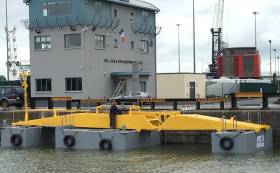Displaying items by tag: Sea Power
Irish Company Prepares to Test Wave Energy Device in Galway Bay
Irish company, Sea Power, is preparing to test their prototype wave energy device at the Galway Bay Marine and Renewable Energy Test Site in the coming weeks. Following successful completion of testing at small scale, the company, which received grant support from the Sustainable Energy Authority of Ireland (SEAI), is now progressing to quarter scale testing in open sea conditions for the first time.
The Sea Power device has been in development for eight years and will soon make the short journey from Foynes in Limerick, where it was built, to the Galway Bay test site. Wave energy devices, such as Sea Power, will ultimately harness the extraordinary power of the waves off Ireland’s coast, to generate electricity.
SEAI and the Marine Institute are working together to develop Ireland’s ocean energy testing infrastructure which includes tank testing facilities at Lir National Ocean Test Facility in Cork, the consented quarter scale test site in Galway Bay and the planned full scale Atlantic Marine Energy Test Site off the Mayo coast.
Commenting SEAI Chief Executive Jim Gannon said: “It’s very encouraging to see innovative Irish technologies progress through the country’s testing facilities. Ocean energy is an emerging sector for Ireland, offering huge potential in job creation and energy security. With some of the most energy rich ocean resources in the world, located off our West coast, Ireland has the potential to become a market leader in this sector. Developing our sustainable energy resources allows us to move away from our reliance on imported fossil fuels, which cost our economy billions of euro a year.”
Peter Heffernan, Marine Institute CEO said: “Sea Power Ltd is a great example of an indigenous Irish company developing novel technology to harness the power of the ocean. Having brought their device through various small scale prototypes, it is exciting to see this new technology being prepared for testing in the sea at quarter scale. We look forward to working with our partners SEAI and Seapower to make a significant contribution in the evolution of ocean energy as an environmentally friendly and cost effective source of power for Ireland.”
Ireland already boasts other successes in ocean energy technologies with Irish companies such as Ocean Energy having progressed to developing a full scale prototype of their OE Buoy device following successful testing in Galway Bay. OpenHydro, based in Greenore Co. Louth recently deployed two 2MW tidal turbines in Northern France.

























































